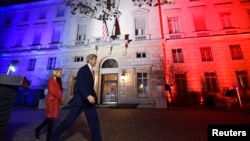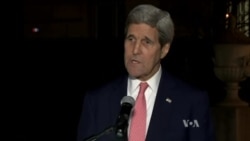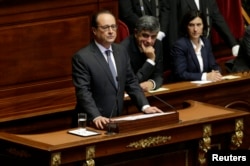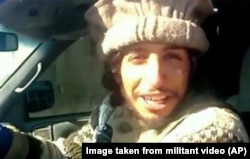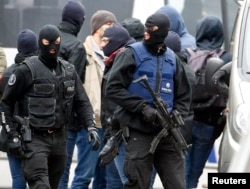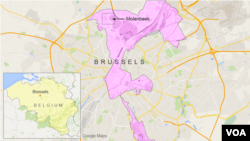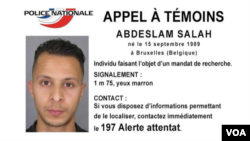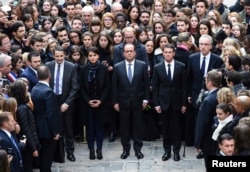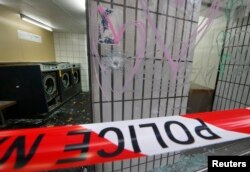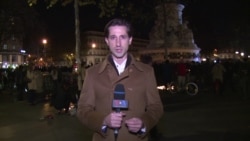U.S. Secretary of State John Kerry is in Paris to show solidarity with France after last week's shootings and suicide bombings.
A State Department spokesman said Kerry will "reiterate America's commitment to our strong relationship with France and express our condolences, as well as our shared resolve to continue countering violent extremism here and around the world."
"Nous vaincrons Daesh," Kerry declared after arriving, adding "We will defeat Daesh, and we are on the course to do so," referring to the Islamic State terrorist group.
WATCH: Kerry speak about America's commitment to France
Stringent security measures were in effect when Kerry landed in the French capital after dark Monday. Journalists were barred from accompanying him, possibly the first such restriction for a state visit to a European capital.
"No one should doubt that the light still shines in the city of light," Kerry said. "Today, we are all Parisians."
Kerry said sorrow over the loss of life will not be overcoming. "We will not change our course or cancel our plans including coming to Paris later this month for the climate conference." He added that President Obama is looking forward to the trip.
Hollande vows to step up offensive
Earlier, French President Francois Hollande vowed to step up the offensive in Syria, where he said Friday's shootings and suicide bombings in Paris were planned.
In a rare address to both houses of France’s parliament in Versailles, Hollande said Friday's "acts of war … were decided and planned in Syria, prepared and organized in Belgium, (and) perpetrated on our soil with French complicity."
Also Monday, French authorities detained 23 people in police raids across the country in the aftermath of Friday's attacks in Paris, as authorities said they have identified the suspected mastermind behind the deadly assault.
A Belgian national of Moroccan descent, Abdelhamid Abaaoud, was named as the possible lead plotter of the attacks that killed 129 people. Belgium authorities had sought Abaaoud earlier this year for a foiled terror attack on police.
In his address Monday, Hollande called on the United Nations Security Council to rapidly issue a resolution against terrorism.
He also told lawmakers he had requested meetings with U.S. President Barack Obama and Russian President Vladimir Putin to discuss unifying their efforts to destroy the Islamic State group. Hollande said he would call for "a union of all who can fight this terrorist army in a single coalition."
‘Intensify its operations’
"In the meantime, France will intensify its operations in Syria," he said, describing the country as "the biggest factory of terrorists the world has known.”
Hollande said the country must be able to expel more quickly foreigners who present a particularly serious risk to the public and suggested changes to the French constitution, such as allowing the ability to bar a dual national from entering French territory if it they present a "terrorism risk."
Hollande said he wants a rapid implementation of “coordinated and systematic controls” of the European Union’s internal and external borders, as well as an agreement by year’s end on an air passenger name registry.
He also said a proposal seeking a three-month extension of France's state of emergency will be presented to parliament Wednesday.
The last time a French president made a speech in front of both houses of parliament in Versailles was in 2009, when Nicolas Sarkozy addressed the global financial crisis.Such an address is a procedure reserved for constitutional revisions and major presidential speeches.
Earlier Monday, French Interior Minister Bernard Cazeneuve said nearly 170 police raids had been conducted overnight. In addition to those detained, more than 100 people were placed under house arrest.
The raids, carried out in Toulouse, Grenoble, Jeumont, Lyon and the Parisian suburb of Bobigny, resulted in the seizure of a number of weapons, including a rocket launcher, a Kalashnikov rifle and bulletproof vests.
Brussels raid
Police raids also took place in the Molenbeek neighborhood of Brussels, Belgium where authorities are searching for Salah Abdeslam, who is believed to have helped carry out the Paris attacks, along with his two brothers. French police released a photo of Abdeslam on Sunday.
No arrests were made in the Brussels raids that targeted the suspect who was in the photo released Sunday.
Media sources are reporting that French officials stopped Abdeslam hours after the attacks Friday night. They pulled him over on a roadway near the Belgian border in a car with two other people, questioned the three and released them.
Salah Abdeslam's brother – Ibrahim Abdeslam – blew himself up at the Bataclan music hall, during an attack there that killed more than 80 people. Belgium authorities had questioned a third brother, Mohamed, but his lawyer confirmed to the French news agency AFP that he had been released Monday.
'Living with' terrorist threat
French Prime Minister Manuel Valls said France has "avoided several attacks," but there could be more "in the coming days, in the coming weeks."
The prime minister said he is not trying to scare people but "we're living with and we're going to live for a long time, with this terrorist threat and we need to prepare ourselves for further attacks."
Meanwhile, France held a midday moment of silence Monday to pay homage to the victims of Friday's terrorism attacks on six sites across Paris. The death toll had stood at 132, but was lowered after an apparent counting error.
'Act of War'
On Sunday, French fighter jets launched massive airstrikes against the Islamic State (IS) stronghold of Raqqa, in Syria, destroying a command post and a training camp.
The planes took off from Jordan and the United Arab Emirates and were operating in conjunction with U.S. forces
A French military statement said 10 fighter jets were used to drop 20 bombs on the Islamic State targets. It was France’s biggest strike to date targeting IS in Syria.
President Hollande has called Friday’s gun and suicide attacks an "act of war."
Investigation
While authorities believe that there were only eight actual attackers, they think that about 20 people were involved.
French prosecutors said Monday one suicide bomber has been identified as Samy Amkimour, a 28-year-old Frenchman charged in a terrorism investigation in 2012.
He had been placed under judicial supervision, but had disappeared and an international arrest warrant had been issued for him.
Prosecutors said three people in Amkimour's family were detained early Monday.
Prosecutors said another suicide bomber was found with a Syrian passport with the name Ahmad Al Mohammad, a 25-year-old born in Idlib. The prosecutor's office said the attacker's fingerprint matched someone who passed through Greece in October.
Another attacker was identified as Bilal Hafdi of Belgium, who was one of the suicide bombers at the stadium.
French police Sunday questioned close relatives of Omar Ismail Mostefai, the first terrorist identified in the attack.
Mostefai's father, brother and sister-in-law were among six people authorities detained. He was one of seven attackers, all of them wearing suicide vests packed with explosives, who died during the simultaneous attacks, with six of them blowing themselves up and the seventh killed in a shootout with police.
French prosecutor Francois Molins said Mostefai was known to police as a petty criminal, but had "never been implicated in an investigation or a terrorist association." The 29-year-old Mostefai lived in Chartres, near Paris.
IS claims responsibility
In its claim of responsibility, Islamic State lashed out at the countries trying to suppress its attempt to establish a "caliphate" in Syria and Iraq, and said France remains "at the top" of its list of preferred targets.
An Islamic State message posted online Saturday said the Paris attacks were a response to the airstrikes the United States and its allies have been launching against its fighters in Iraq and Syria for more than a year.
The Islamic State singled out France in its online statement. "The stench of death will not leave their noses," it said of French leaders.
Hundreds of Parisians who had gathered to observe vigils at the Place de la République and Carillion Café, one of the places that was attacked, panicked Sunday when sudden noises sent them running.
The Associated Press reports that the crowd was spooked by firecrackers.
The Place de la République was the scene of massive peace demonstrations after January’s Paris attacks.
VOA correspondent Daniel Schearf contributed to this report from Paris
WATCH: Daniel Schearf reports from the Place de la Republique




